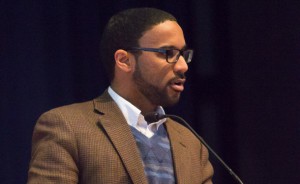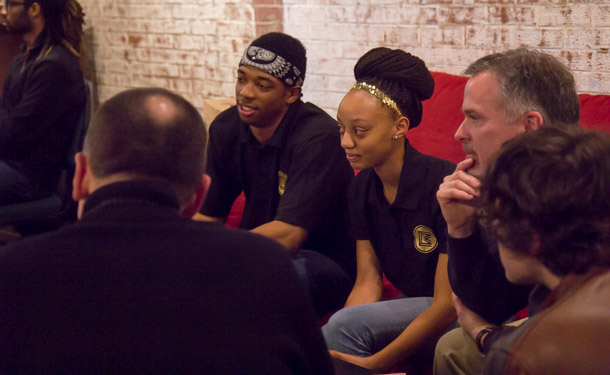Eastern Mennonite University’s Black History Month events began with a Town Hall on Race and included speakers, a soul food dinner, trivia and game nights, and two movie screenings. Events were coordinated by the Multicultural and International Student Services, Black Student Alliance (BSA), Campus Ministries and Dining Services. [See slide show below.]
Town Hall on Race
About 50 people attended the evening event. Facilitators from BSA asked participants to discuss in small groups two main questions.
- In what ways does racism and oppression affect the work of EMU?
- In what ways does racism and oppression affect the spirit of EMU?
Following the discussion, each group shared key points. Many groups answered both questions with negativity that they have seen around campus.
One group stated that college is a time of discovery, but being in an environment riddled with racism hinders the ability to truly discover oneself. Also mentioned was the feeling of forced relationships within the classroom due to race, which in turn affects the ability to work productively with classmates. Many groups also talked about microaggressions, which are everyday verbal or nonverbal slights or insults that communicate hostile, derogatory, or negative messages – such as racist jokes.
“Microaggressions are products of prejudice and ignorance. Those experiences reach beyond race but affect us all,” said senior Christian Parks, who helped to facilitate the event.
The groups were also asked to discuss what they believed would be a good way for EMU to start instituting change in regards to racism and oppression. Some examples included hiring more people of color as faculty, and extending anti-racism and anti-oppression training in all institutional levels.
Participants were encouraged to attend BSA meetings on the second and fourth Thursday of every month in University Commons Room 124. Parks also mentioned the potential for a privilege-themed playback theater event in March, which would “open the space for white folks on campus to share their experiences of privilege as a way to continue the work of understanding how privilege impacts work and spirit at EMU.”
First-year student Kendi Mwongo said the meeting was “beneficial,” and she would support it in the current format on a monthly basis.
The challenge of committing to racial justice

Drew Hart, an author and doctoral candidate at Lutheran Theological Seminary at Philadelphia, spoke at a Thursday evening lecture titled “Why Have So Many Christians Been So Wrong for So Long?: Racial Formation and Counterintuitive Solidarity.” He also offered a Friday morning chapel forum on the topic “Learning to Love Black People, ” drawing from Hebrews 11:23-28.
Hart said that an “epistemological divide” exists between people’s understandings of race and racism, with different paths and circles of socialization leading to seeing the same event “from very different perspectives.”
“We have very different ways of understanding, narrating and responding to race in America,” Hart said. “Take note of what’s unique and different about the culture that shaped you.”
He noted that while things have certainly changed in the past four centuries of American history, the country hasn’t “magically delivered on social justice.” Instead, the issues have “mutated into different forms,” and maintained a racialized and hierarchical framework. Going forward, he pointed to the “Jesus-shaped, counter-intuitive way” that is “drawn to the those on the margins of society” and empowers them and seeks to end domination.
Hart, who has a blog titled “Taking Jesus Seriously” hosted by The Christian Century, uses the hashtag #anablacktivism. He followed up Friday’s chapel time with a talkback session and signed copies of his most recent book, Trouble I’ve Seen: Changing the Way the Church Views Racism (published by Herald Press), while on campus.
